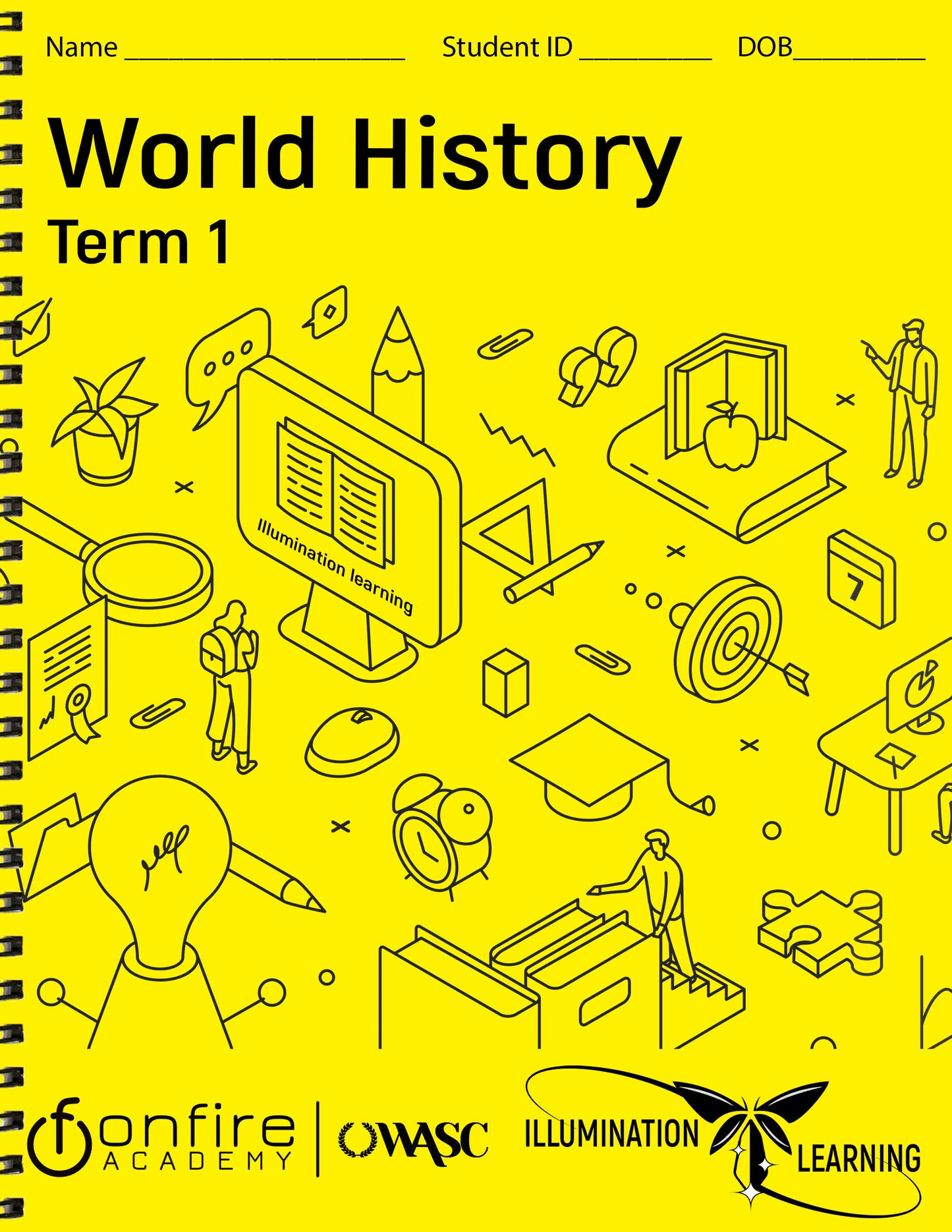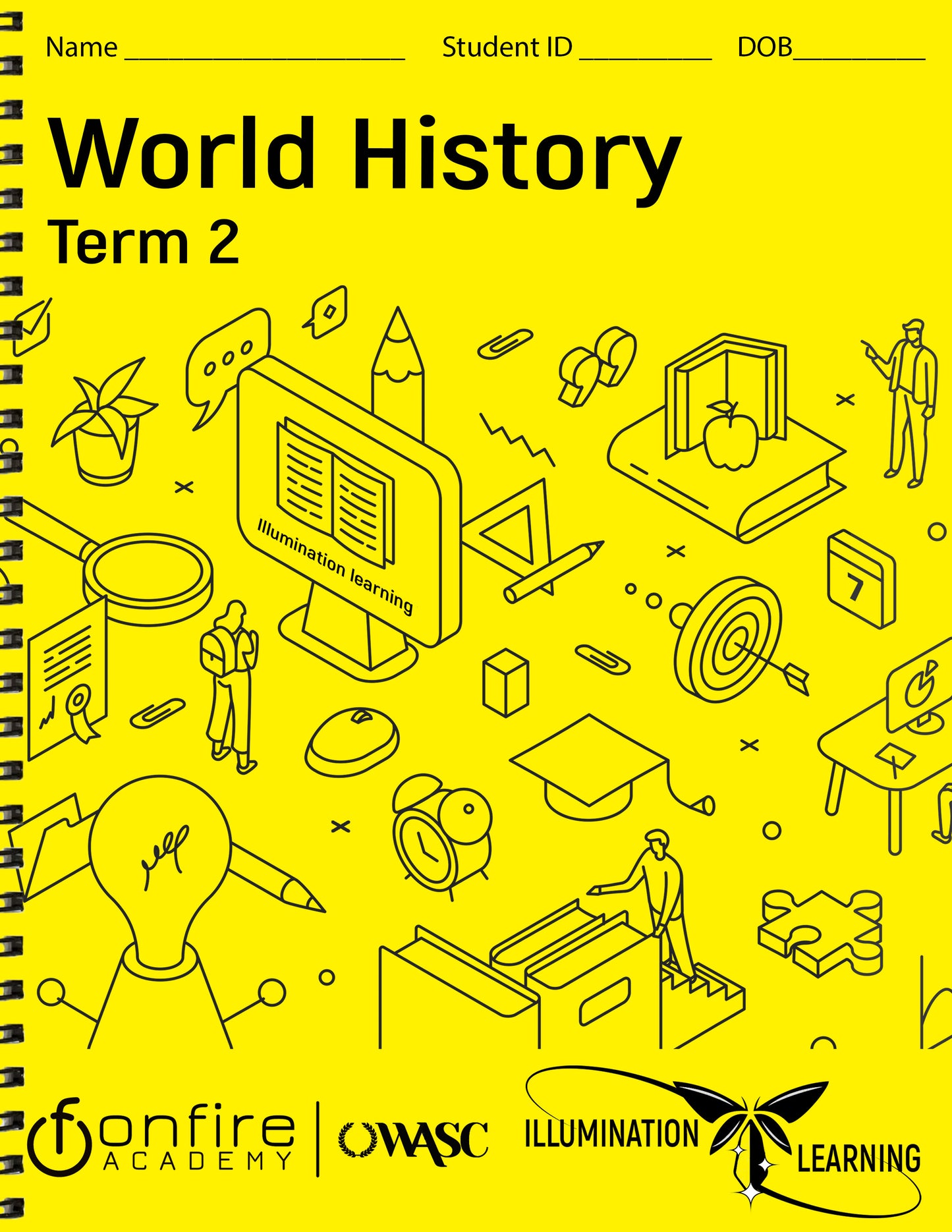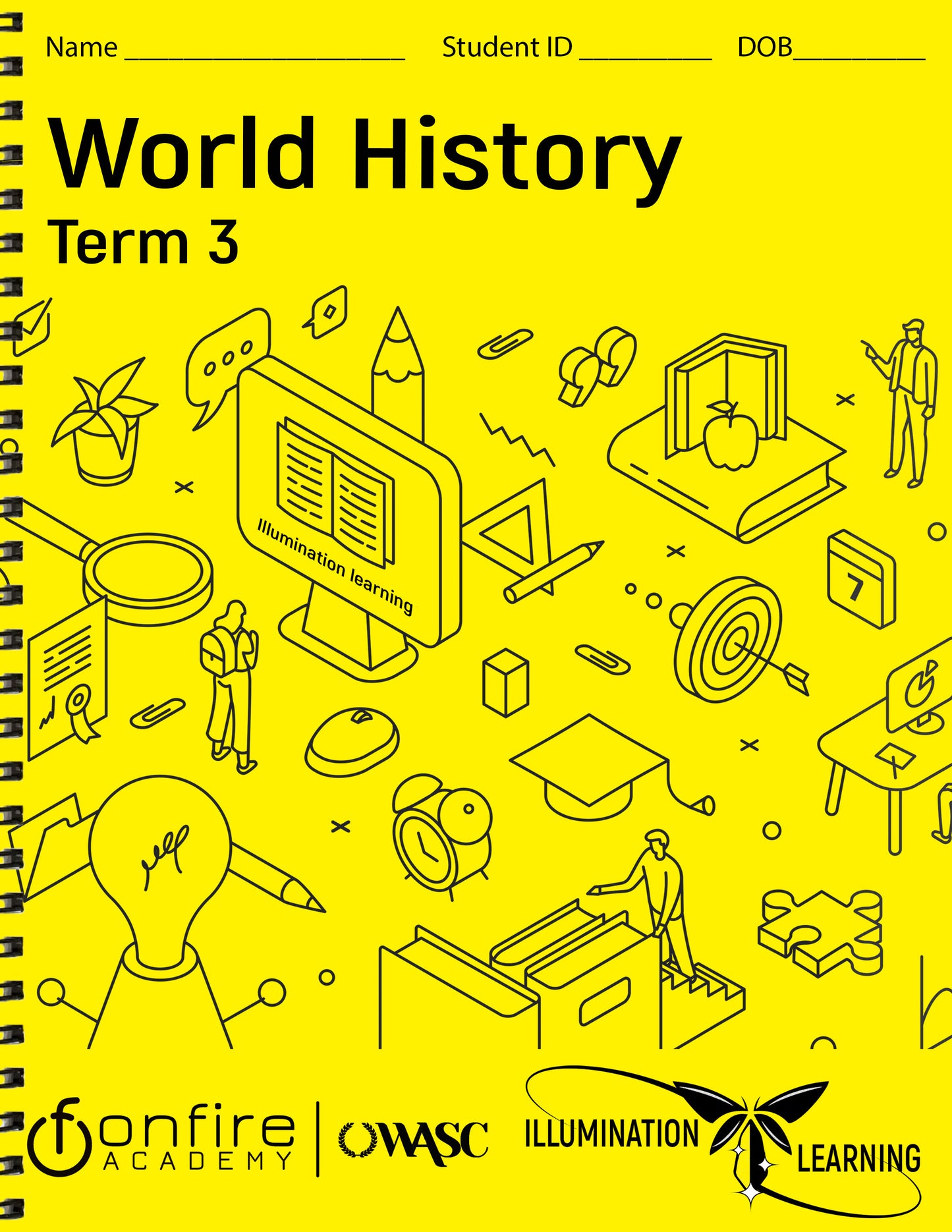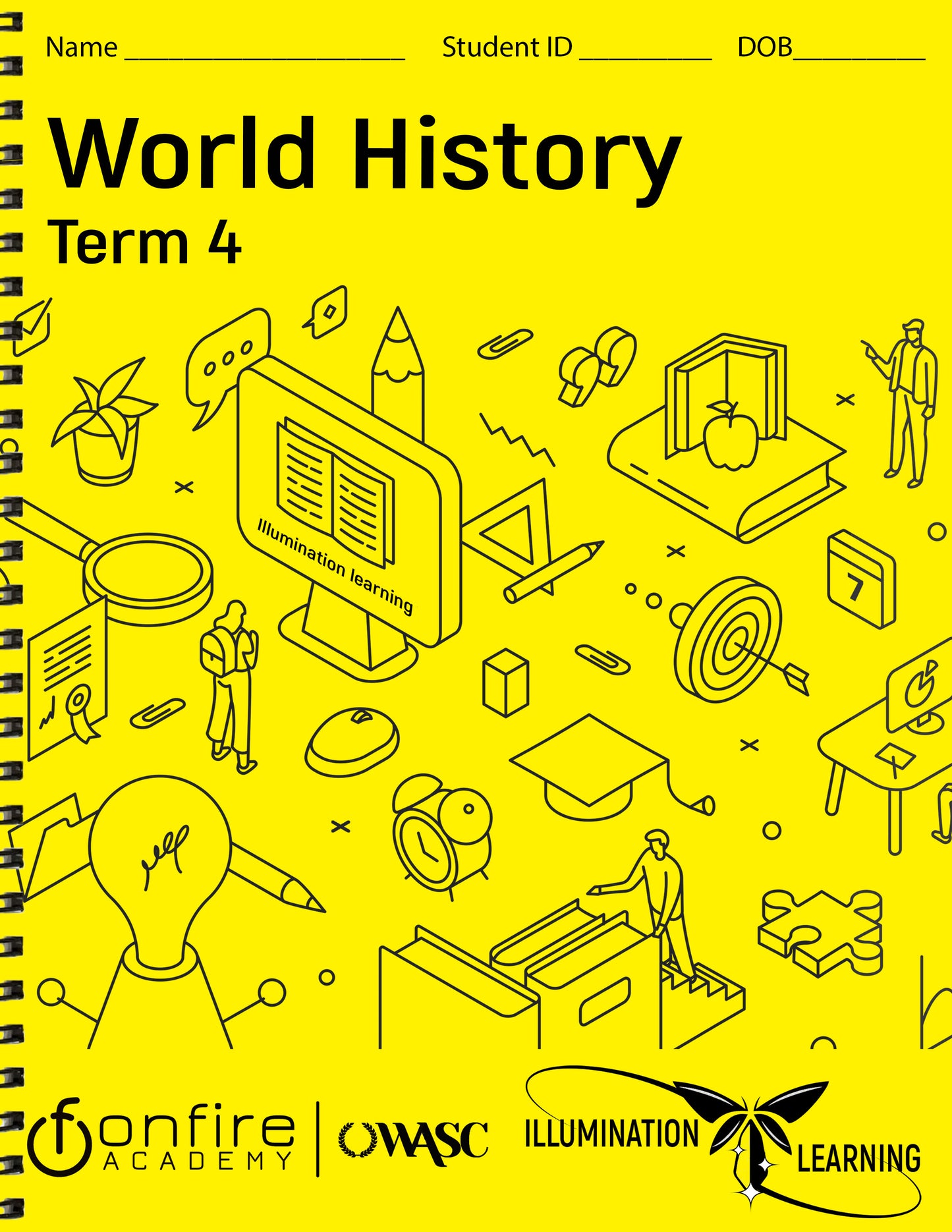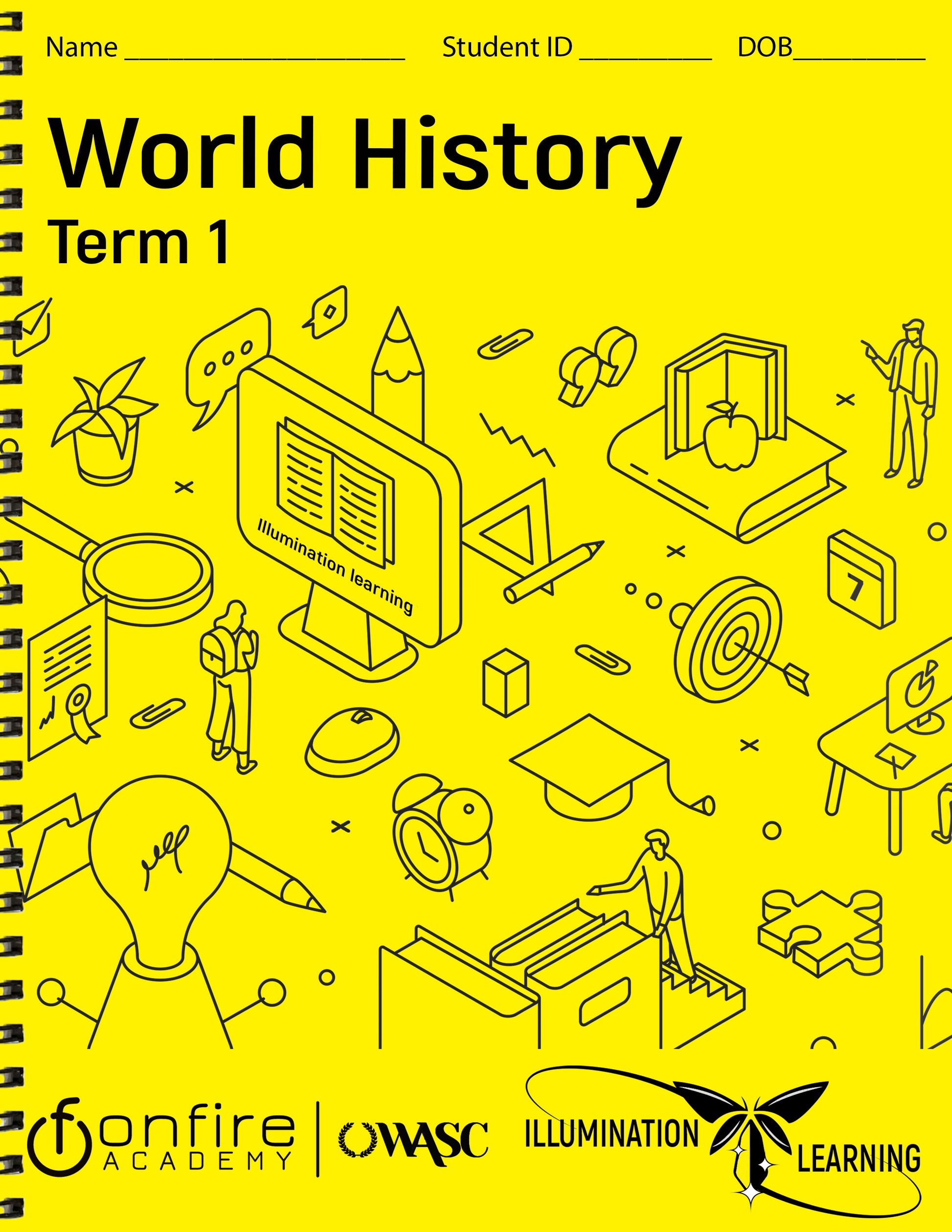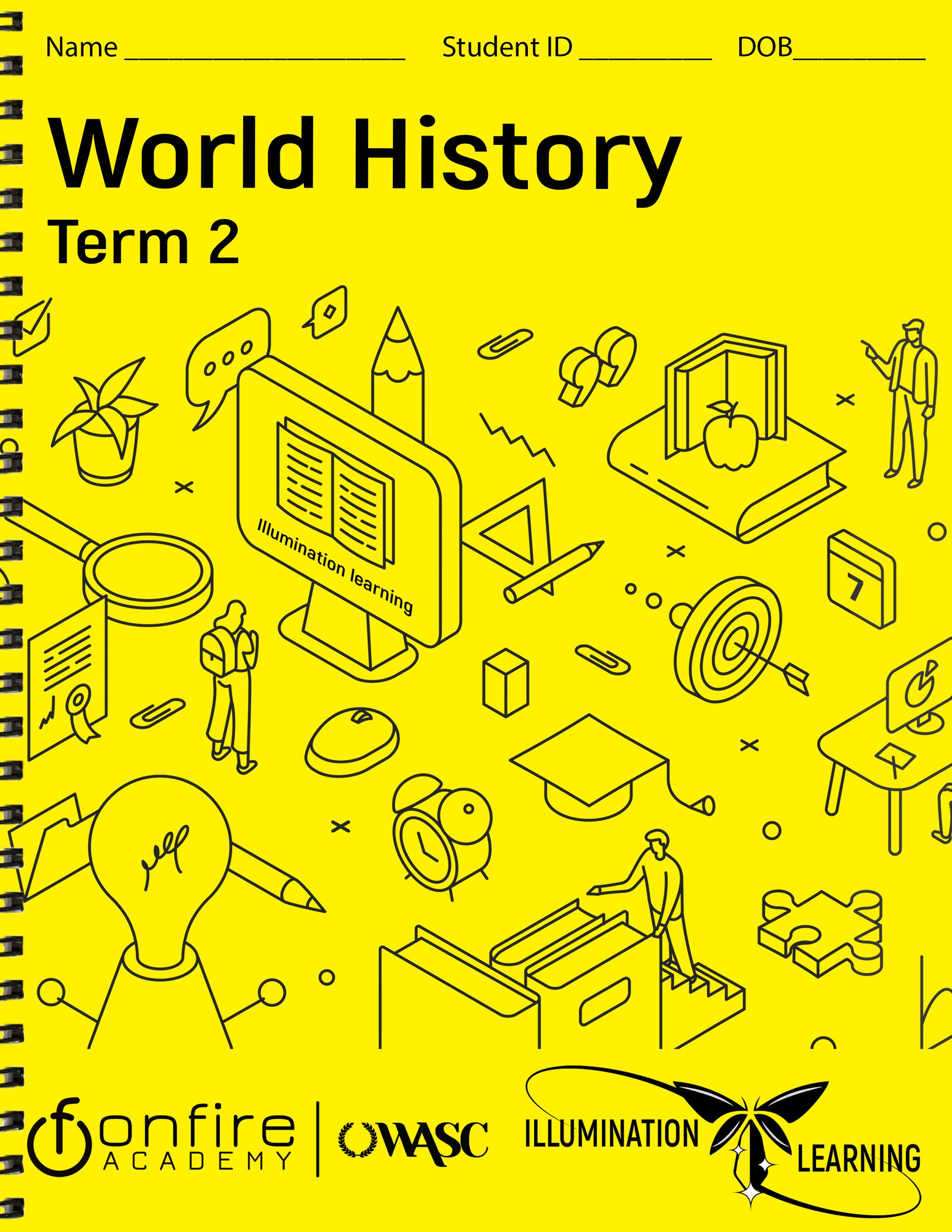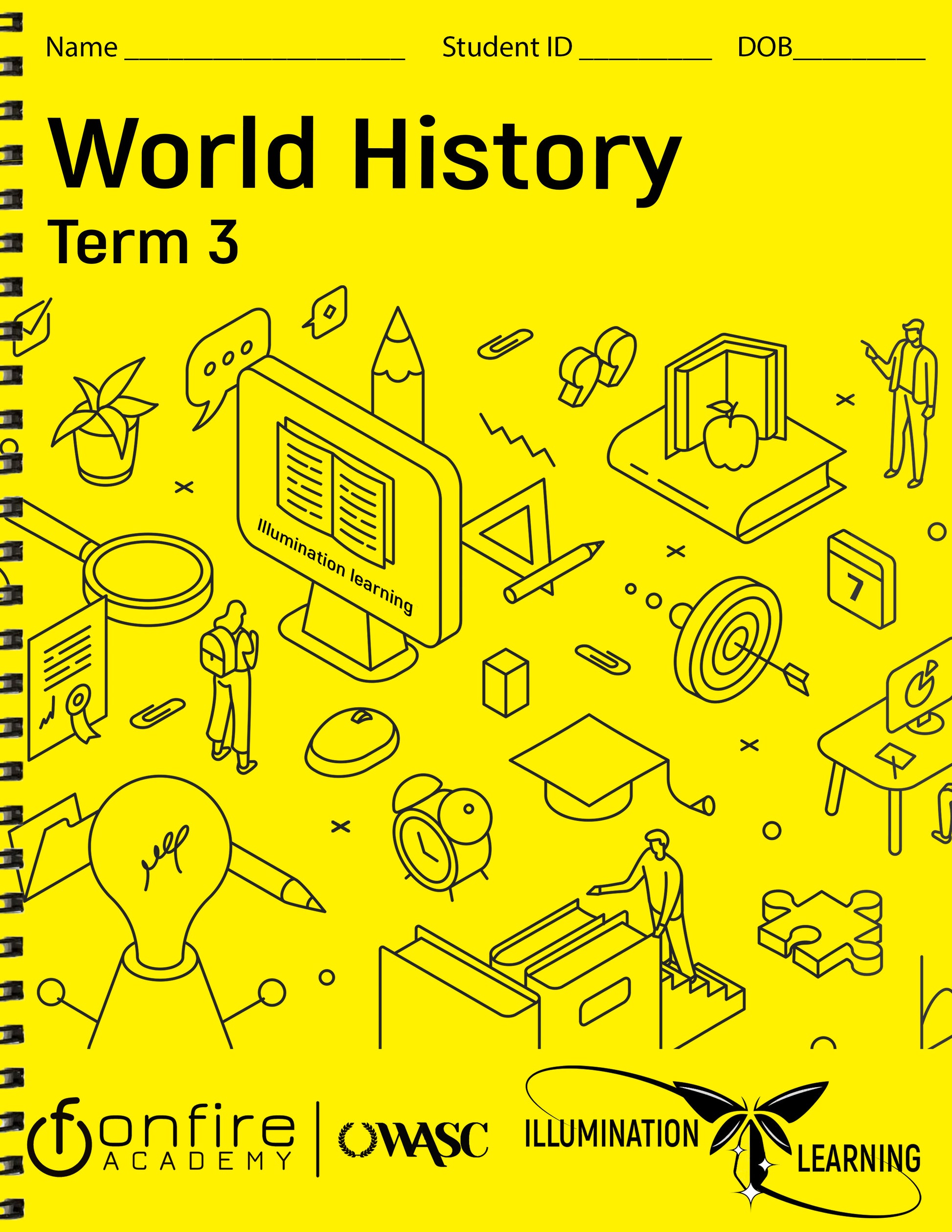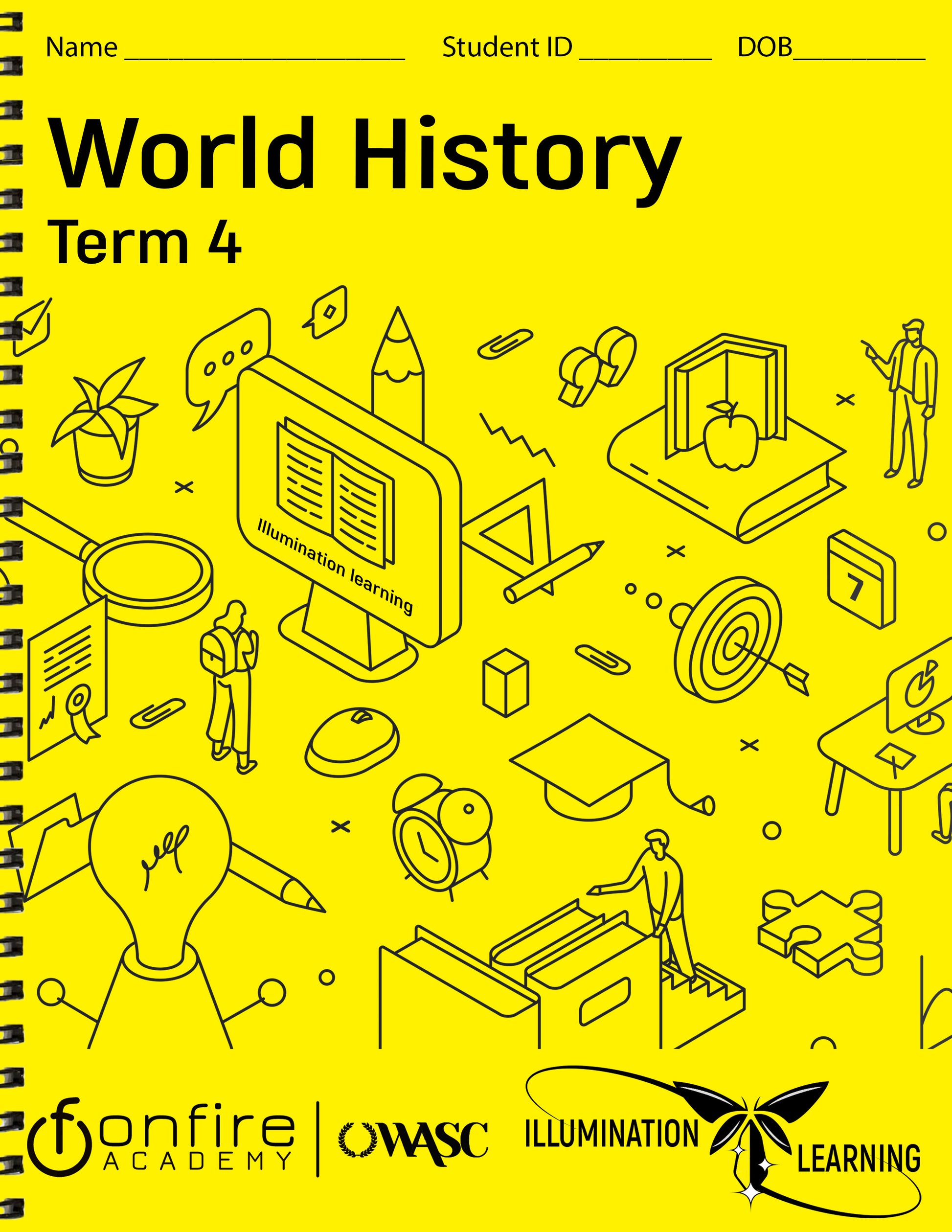ILLUMINATION LEARNING
World History 𝙃𝙤𝙢𝙚 𝙎𝙘𝙝𝙤𝙤𝙡
World History 𝙃𝙤𝙢𝙚 𝙎𝙘𝙝𝙤𝙤𝙡
Couldn't load pickup availability
World History – Term 1 - 4 (sold separately)
This paper and pencil course provides a global perspective on the human past, guiding students through the major events, civilizations, and themes that have shaped world history from ancient times to the modern era. Students examine cultural, political, economic, and technological developments across regions and time periods, fostering a broad and interconnected understanding of global history.
The course begins with early river valley civilizations and classical empires, exploring their contributions to government, religion, and philosophy. Students then trace the rise and fall of major world religions, the expansion of trade networks, and the influence of empires in Asia, Africa, the Americas, and Europe.
Key topics include the Renaissance and Reformation, global exploration and colonization, revolutions in science, industry, and government, as well as the impact of imperialism and global conflict in the 19th and 20th centuries. Students analyze both world wars, the Cold War, decolonization, and modern global challenges.
Click Here for a Sample Chapter!
__________________________________________________________________________________
World History Term 1
1. Introduction to World History
1.1 What Is History?
1.2 Why Study History?
1.3 Sources of History
1.4 Chronology and Timelines
1.5 Historiography
1.6 Written Questions
1.7 Fill in the Blanks
1.8 Multiple Choice Questions
2. Early Civilizations
2.1 Prehistoric Era
2.2 Paleolithic and Neolithic Ages
2.3 Early Human Migration
2.4 Mesopotamia
2.5 Sumer and the First City-States
2.6 Hammurabi’s Code
2.7 Ancient Egypt
2.8 Nile River Civilization
2.9 Pharaohs and Pyramids
2.10 Indus Valley Civilization
2.11 Harappa and Mohenjo-Daro
2.12 Daily Life in the Indus Valley
2.13 Written Questions
2.14 Fill in the Blanks
2.15 Multiple Choice Questions
3. Ancient Greece and Rome
3.1 Greek City-States
3.2 Democracy and Philosophy
3.3 Socratic, Platonic, and Aristotelian Philosophy
3.4 Alexander the Great
3.5 Roman Republic
3.6 Roman Expansion
3.7 Roman Empire
3.8 Caesar Augustus and Pax Romana
3.9 Roman Society and Culture
3.10 Roman Law and Administration
3.11 Decline and Fall of Rome
3.12 Written Questions
3.13 Fill in the Blanks
3.14 Multiple Choice Questions
4. Medieval World
4.1 Byzantine Empire
4.2 Constantinople
4.3 Justinian’s Code
4.4 Medieval Europe
4.5 Feudalism and Manorialism
4.6 The Crusades
4.7 Islamic Golden Age
4.8 Islamic Achievements in Science and Culture
4.9 The House of Wisdom
4.10 Written Questions
4.11 Fill in the Blanks
4.12 Multiple Choice Questions
5. Effects of History on the Modern World
5.1 The Prehistoric Era and Modern Lessons
5.2 Mesopotamian Influence
5.3 Ancient Egypt’s Legacy
5.4 Indus Valley and Urban Planning
5.5 Ancient Greece and Rome in the Modern World
5.6 Byzantine, Medieval, and Islamic Contributions
5.7 Written Questions
5.8 Fill in the Blanks
5.9 Multiple Choice Questions
__________________________________________________________________________________
World History Term 2
1. The Renaissance (14th – 17th Century)
1.1 Overview of the Renaissance
1.2 Notable Figures and Their Contributions
1.3 Spread of the Renaissance Across Europe
1.4 Written Questions
1.5 Multiple Choice Questions
2. The Age of Exploration (15th – 17th Century)
2.1 Key Concepts and Definitions
2.2 Motivations and Driving Factors
2.3 Notable Explorers and Their Voyages
2.4 Exploration of Africa and Asia
2.5 Motivations for Exploration
2.6 Key Explorers and Their Voyages
2.7 Impact on Africa and Asia
2.8 Challenges and Controversies
2.9 Consequences of Exploration
2.10 Economic Transformations
2.11 Cultural and Social Impacts
2.12 Political Changes
2.13 Technological Advancements
2.14 Environmental Impact
2.15 The Columbian Exchange
2.16 Effects on Indigenous Cultures
2.17 Written Questions
2.18 Multiple Choice Questions
3. The Enlightenment (17th – 18th Century)
3.1 Core Principles
3.2 Enlightenment Period and Its Influence on Society
3.3 Major Enlightenment Thinkers
3.4 Political and Societal Impact of Enlightenment Ideas
3.5 Influence on Revolutions During the Enlightenment
3.6 Influence on the American Revolution
3.7 Role in the French Revolution
3.8 Written Questions
3.9 Multiple Choice Questions
__________________________________________________________________________________
World History Term 3
Chapter One: Introduction to the Modern Era
1.0 Defining the Modern Era (1750–Present)
1.1 The Transition from the Early Modern Period
1.2 Key Movements: The Enlightenment, Industrial Revolution, Political Shifts
1.3 Themes: Nationalism, Imperialism, and Global Expansion
1.4 Written Questions
1.5 Multiple Choice Questions
Chapter Two: The Age of Revolutions
2.0 The Industrial Revolution (c. 1750–1850)
2.1 Political Revolutions: American, French, and Others
2.2 The Spread of Nationalism
2.3 Unification Movements in Italy and Germany
2.4 Independence Movements in Latin America and India
2.5 Written Questions
2.6 Multiple Choice Questions
Chapter Three: The Rise of Global Empires
3.0 European Imperialism (c. 1750–1914)
3.1 Motivations for Imperialism: Economic, Political, Cultural
3.2 The Scramble for Africa and the Berlin Conference
3.3 The Impact of Imperialism on Colonized Regions
3.4 Written Questions
3.5 Multiple Choice Questions
Chapter Four: The World at War
4.0 World War I: Causes, Alliances, and Outcomes
4.1 The Treaty of Versailles and the League of Nations
4.2 The Interwar Years: Roaring Twenties and the Great Depression
4.3 The Rise of Totalitarian Regimes
4.4 World War II: Theaters of War, the Holocaust, and the Atomic Age
4.5 Written Questions
4.6 Multiple Choice Questions
__________________________________________________________________________________
World History – Term 4
Table of Contents
Chapter 1: Post-War Reconstruction and the Cold War Era
1.1 The Aftermath of World War II
1.1.1 Post-War Reconstruction in Europe and Japan
1.1.2 The Marshall Plan and the Truman Doctrine
1.1.3 The Formation of the United Nations and its Early Challenges
1.2 The Cold War
1.2.1 Origins and Ideological Conflict
1.2.2 Key Events of the Cold War (Berlin Airlift, Cuban Missile Crisis, Space Race)
1.2.3 Proxy Wars (Korea, Vietnam, Afghanistan)
1.3 Decolonization and Independence Movements
1.3.1 End of Empires and the Birth of New Nations
1.3.2 Key Independence Movements in Africa, Asia, and the Middle East
1.3.3 Challenges of Nation-Building and Neocolonialism
1.4 Written Questions
1.5 Fill in the Blanks
1.6 Multiple Choice Questions
Chapter 2: Social Movements and Cultural Shifts
2.1 Civil Rights Movements
2.1.1 The Struggle for Racial Equality in the United States
2.1.2 Apartheid and its Demise in South Africa
2.1.3 Peoples and Recognition of Rights
2.2 The Rise of Feminism and Gender Equality
2.2.1 Second-Wave Feminism and its Impact
2.2.2 Global Movements for Women's Rights
2.3 The Information Age and Technological Revolution
2.3.1 The Advent of Computers and the Internet
2.3.2 Impact on Society and Global Connectivity
2.3.3 Ethical Considerations in the Digital Age
2.4 Written Questions
2.5 Fill in the Blanks
2.6 Multiple Choice Questions
Chapter 3: Globalization and Economic Developments
3.1 The Rise of Globalization
3.1.1 Economic Liberalization and the World Trade Organization (WTO)
3.1.2 Multinational Corporations and Global Supply Chains
3.1.3 Cultural Exchange and Global Media
3.2 Economic Crises and Responses
3.2.1 The Oil Crises of the 1970s
3.2.2 The Global Financial Crisis of 2007–2008
3.2.3 Economic Reforms and Austerity Measures
3.3 Sustainable Development and Climate Change
3.3.1 Environmental Movements and International Agreements
3.3.2 The Challenge of Sustainable Development
3.3.3 Renewable Energy and the Green Economy
3.4 Written Questions
3.5 Fill in the Blanks
3.6 Multiple Choice Questions
Chapter 4: The New World Order and Contemporary Issues
4.1 The End of the Cold War and New Political Realities
4.1.1 The Fall of the Berlin Wall and the Dissolution of the Soviet Union
4.1.2 The Emergence of the European Union
4.1.3 The Rise of China and Shifting Global Power Dynamics
4.2 Terrorism and Security
4.2.1 The Rise of Global Terrorism and the Events of September 11, 2001
4.2.2 The War on Terror and its Global Impact
4.2.3 Cybersecurity and New Forms of Warfare
4.3 Contemporary Social and Political Movements
4.3.1 The Arab Spring and its Aftermath
4.3.2 Social Media and Political Mobilization
4.4 Written Questions
4.5 Fill in the Blanks
4.6 Multiple Choice Questions
Share
